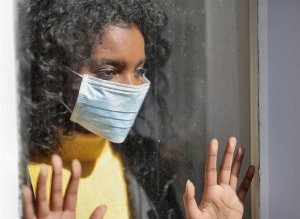End-of-Lockdown Anxiety
Published May 26, 2020 • By Léa Blaszczynski
Fear of infection, panic on public transportation or in stores, readjustment to work, the need for consumerism, social pressure... The fears caused by the end of the COVID-19 lockdown are numerous.

According to The American Psychological Association, almost 50% of American adults with children and 28% of Americans adults without children are experiencing higher levels of stress than in recent years! This is not surprising when we know that a period in quarantine of only 10 days can predictive of post-traumatic stress disorder, according to a synthesis of 24 studies carried out in 10 different countries by The Lancet.
Social anxiety and impulsive behavior
This emotional state even has a name: cabin fever. It corresponds to the fear of leaving home or of coming into contact with others again after a long period of isolation. The variety and intensity of the symptoms is specific to each person: fatigue, difficulty getting out of bed in the morning or needing frequent naps, lethargy, sadness or depression, loss of patience, irritability, etc.
Social phobias are thus on the rise, such as agoraphobia (fear of crowds, of a place from which it is difficult to be rescued), anthropophobia (fear of people, also known as social anxiety disorder) or blemmophobia (fear of the gaze of others, of being judged or perceived as abnormal). Excessive behavior and the need to "make up for lost time", such as taking risks to find loved ones, compulsive shopping, overeating or drinking, etc., are also common.
How can I come out of lockdown successfully?
This period is all the more difficult as there are still many uncertainties. Mental or emotional overload can be alleviated if the rules are clear and the measures are concrete: wear a mask, follow markings on the floor in shops, respect physical distances, etc.
Therefore, if you are suffering from anxiety, don't hesitate to go for a walk in the open air or nature if you can. This will allow you to get back in touch with the outdoors while enjoying the spring weather. Get back into a good sleeping pattern by setting your alarm clock in the morning and cutting back on naps during the day. Plan outings with defined objectives: go shopping for a specific recipe, walk around your neighborhood, bring your glass bottles to a recycling bin, etc.
Above all, be kind to yourself, do things at your own pace during this mourning phase. You must accept that daily life will be turned upside down again and that life will not be exactly the same as before. Do not hesitate to contact a professional if you feel the need, you can also consult the Disaster Distress Helpline for free counseling or support by phone or text 24/7, 365-days-a-year.
Finally, while it is essential to remain vigilant and to respect the barrier gestures, keep in mind that in case of infection, the seriousness of the disease is most often very low with, on average, a rate of serious complications below 15% and a mortality rate below 1%. Obviously, these rates are higher in those at risk, such as the elderly, who require even more rigorous precautions than others. But even if they have conditions identified as risk factors (obesity, diabetes, cancer and other chronic diseases), the vast majority of adults do not develop severe forms. If you have any doubts about the precautions you should take, do not hesitate to contact your medical team.
Helpful links
- Disaster Distress Helpline: 24/7, 365-day-a-year, multilingual, confidential national hotline dedicated to providing immediate crisis counseling for people who are experiencing emotional distress related to any natural or human-caused disaster. Call 1-800-985-5990 or text TalkWithUs to 66746 or Hablanos to 66746 for Spanish.
- NAMI HelpLine: free, nationwide peer-support service providing information, resource referrals and support to people living with a mental health conditions, their family members and caregivers, mental health providers and the public. Call 1-800-950-NAMI (6264) (M-F 10am-6pm ET), text NAMI to 741-741, or email info@nami.org.
- National Suicide Prevention Lifeline: If you or someone you know is in crisis—whether they are considering suicide or not—please call the toll-free Lifeline at 800-273-TALK (8255) to speak with a trained crisis counselor 24/7.
- National Domestic Violence Hotline: Trained expert advocates are available 24/7 to provide confidential support to anyone experiencing domestic violence or seeking resources and information. Help is available in Spanish and other languages. Call 800-799-SAFE (7233), text LOVEIS to 22522, or email thehotline.org.
Was this article helpful to you? Do you have any thoughts to share with the community?
Take care and stay home!
Sources :
https://www.apa.org/news/press/releases/stress/2020/report
https://www.thelancet.com/journals/lancet/article/PIIS0140-6736(20)30460-8/fulltext
https://www.insee.fr/fr/statistiques/4478728?sommaire=4476925#consulter-sommaire
https://www.atoute.org/n/article383.html?fbclid=IwAR2vE585iM_s5qZxD2MQYLPn7fH2YNgS4OnVLnn58ijDQT2mVZCcHU6mMTU
Comments
You will also like

What are the dangers associated with the over-the-counter sale of certain medicines?
Dec 19, 2020 • 6 comments

 Facebook
Facebook Twitter
Twitter

